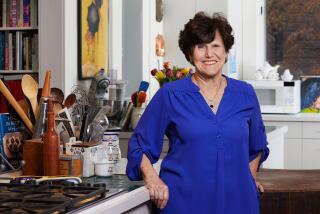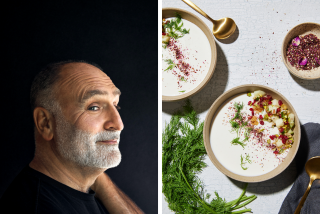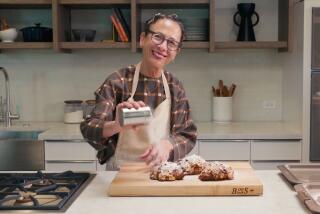‘The Baking Powder Wars’ is one writer’s ode to the invisible
Probably nobody grows up thinking they’ll write books about invisible ingredients, but Linda Civitello, author of the new “Baking Powder Wars: The Cutthroat Food Fight That Revolutionized Cooking,” grew up intrigued by foods she could not see.
A longtime Southern California transplant, Civitello is an Italian American who was raised in New England in the 1950s. In that strictly Italian foodscape, she could only dream about what she saw in the single cookbook her family owned, “The United States Regional Cook Book,” edited by Ruth Berolzheimer.
“What’s an avocado? Okra? Swedish yeast bread cut with scissors? It was endlessly fascinating, these things from other parts of the country,” Civitello said recently. That began a curiosity that led to her passion for food, a course that zigzagged through a career in film and TV, and led to her teaching, studying and writing about food history.
“My life has been one big detour,” Civitello said.
Civitello graduated from Vassar with a bachelor’s degree in English, then moved to Boston. During the day, she worked for Paramount Pictures in distribution, and by night, she worked in theater — and met Al Pacino. When she told the actor that he’d inspired her, he told her: “If you come to New York, look me up. Maybe I’ll have a job for you.”
“I said, ‘Al, give me a job and I’ll come to New York,’ and that was the one time in my life I said the exact right thing,” she said. She worked with Pacino on “Serpico,” reading lines with him on set and cooking on Long Island, using the summer’s ample produce — peeling tomatoes, stuffing peppers and making blueberry pies. She stayed in New York from 1973 until 1976, when she moved to California.
This is when, as Civitello puts it, she began cooking in self-defense.
Los Angeles had no Little Italy, and she had to make her own bread, sausage and ricotta. Her jobs did not detour to the food lane for quite a while, though. Instead, she worked in film and TV, on car crash and monster movies, and helped in the writing of Kirk Douglas’ bestselling autobiography, “The Ragman’s Son.” The Guinness Book of World Records took her around the globe multiple times to chase and create oddities, such as setting the record for the Most Snakes Ever Charmed at One Time.
“I found a snake charmer village in India, and we invited 150 snake charmers,” Civitello said, recalling the hundreds of uncaged snakes. “I think we were all nuts, but this is what we did.”
Her next line of work was slightly tamer: doing computer programming, research and other tasks at multinational law firms. Attending a history conference in the late 1990s with a friend, she was inspired to take another detour and study history.
“I realized I had something to contribute. I wanted to know more. I wanted to read and discuss things with people,” Civitello said, so she applied to UCLA to get her master’s. Her thesis, “Top Dogs and Work Horses: Animal Labor in the Film Industry,” explored star animals and extras.
Always, her curiosity about food was also steering her pursuits. Civitello studied with the Culinary Institute of America, where she learned to make ice cream. These interests began to merge with her work when she was in graduate school and began teaching food history at Le Cordon Bleu. Her first book, “Cuisine and Culture: A History of Food and People,” began when the publisher sought her out to write a textbook; now it’s the standard for culinary schools in North America.
Civitello’s latest book began as she was casting her net wide for a topic for her doctorate and found newspaper articles about corruption in the baking powder industry. After reading about how the Missouri state legislature was bribed for six years around 1900, she realized she had the story of a lifetime.
“Baking Powder Wars” is a biography of baking in America. On the blank slate of America, beyond European constraints like commercial baking guilds and traditions like communal ovens, innovation ruled and American women, tied to home production of bread, were ready for shortcuts.
Civitello is not discussing a dead moment in time, but something that continues to influence food. Baking powder has been globally disseminated through American products by companies such as McDonald’s and IHOP, and also through iconic American foods such as cookies and biscuits.
“A baking powder biscuit is a uniquely American bread,” she said. “It’s also the little black dress of bread. You can dress it up, dress it down, make it sweeter, make it savory. It can look elegant and sophisticated or really rustic.”
Civitello will give a talk and tasting at Grist & Toll, 990 S. Arroyo Parkway, Pasadena, at 1 p.m. Oct.14.
Amy Halloran is the author of “The New Bread Basket.”
ALSO:
Apples are in season. We have recipes
The definitive guide to Los Angeles doughnut shops
The story behind the spicy lobster at Newport Seafood
More to Read
Eat your way across L.A.
Get our weekly Tasting Notes newsletter for reviews, news and more.
You may occasionally receive promotional content from the Los Angeles Times.






